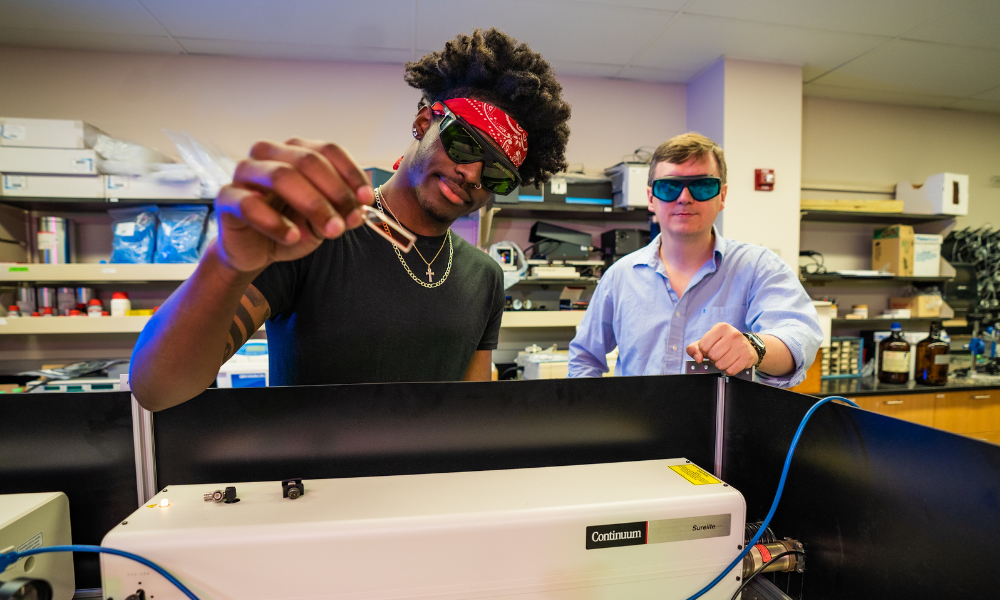Understanding the Neurobiology of Trauma
Independent Scholars
SUMMARY: Deaquan Nichols (’23) receives Gilman International Scholarship for Study at Oxford University
Deaquan Nichols is a 2021 recipient of the U.S. Department of State’s Benjamin A. Gilman International Scholarship. The Gilman award enables students to gain proficiency in diverse cultures, which is important to academic and career preparation. Deaquan will use the award to travel to the United Kingdom to participate in the Honors Semester program at Oxford University. At Oxford, he will take classes on the psychology of trauma, developmental biology, and Shakespeare. “Oxford will help serve as a great foundation for my future career in medicine,” he says. “It will provide me with insight from some of the world’s brightest minds on the ethics and morality of science as a whole.”
Nichols is double majoring in Biophysical Chemistry and Independent Scholars and minoring in Honors Interdisciplinary Studies, Biochemistry, and Pre-Medicine. He is mentored by Dr. Oleksandr Kokhan who conducts research on cytochromes in the JMU Chemistry and Biochemistry Department. Cytochromes are a large class of heme-containing proteins involved in energy transduction and biological catalysis. Nichols is studying how different proteins affect photosynthesis in Kokhan’s lab. He hopes that by understanding natural photosynthesis scientists can produce energy through methods of artificial photosynthesis in the future. Artificial photosynthesis may also provide solutions for carbon capture and conversion. “It was 70 degrees in Virginia on Christmas Day,” he says. “The need for clean and efficient energy is urgent.” Nichols presented a paper at the American Chemical Society virtual meeting this fall, and he will be presenting another at the upcoming Biophysical Society conference in San Francisco. He received the Biophysical Society’s travel award to attend the San Francisco meeting.
Nichols has designed an Independent Scholars major in the Neurobiology of Trauma that complements his interest in a career in neurosurgery. “As a neurosurgeon, I’ll be placed in situations where I must react quickly to patient traumas,” he notes. “The acquisition of these skills will assist me in my future career as a student, researcher, and person.” In his proposal for the major, Nichols describes trauma as the result of a networking effect that takes over the brain—controlling behaviors and altering our perceptions of the world. “By merging chemical, biological, and psychological practices, we can gain a relative understanding of trauma, and stop the virus before it spreads by means of communication, genetics, and individual experiences and actions,” he explains. The subject of trauma is also personal. “Though I am only 19 years old, I have lost several people I love due to drugs, gang-related activity, or poor health. Trauma is a concept that I have dealt with my entire life.”
Independent Scholars cultivates creativity, independence, professionalism, and problem-solving skills and qualities in high demand by employers and post-baccalaureate programs. Nichols notes medical school representatives have described his Independent Scholars major as a serious and admirable opportunity for investigations in scientific fields adjacent to his career ambitions. He is currently shadowing the chief of acute care surgery and director of the trauma and surgical critical care unit at Carillon Roanoke Memorial Hospital as part of his experiential learning requirement.
Nichols is a resident assistant in the Haynes Scholars Learning Community for minorities in STEM disciplines. He is founder and president of the JMU chapter of the National Organization for the Professional Advancement of Black Chemists and Chemical Engineers (NOBCChE), and treasurer for the campus chapter of the NAACP. He serves as an Honors College Ambassador, welcoming prospective STEM students and visiting families to campus. He is a member of the Diversity, Equity, and Inclusion committee, mentored by Honors College associate dean Dr. Fawn-Amber Montoya. He tutors students in multiple courses and continues to conduct research in the lab with Dr. Kokhan. This includes an immersive summer research experience funded by the Witherspoon Scholarship, an endowed JMU scholarship made possible by the generous donation of Margaret E. and Douglas F. Witherspoon. He is also a STEM Second Century Scholar.
Nichols was a high school student participant in the 2018 Summer Honors Institute at JMU. The Summer Honors Institute is a unique weeklong program where talented rising high school juniors and seniors sample courses and attend college-prep workshops. Nichols participated the Institute’s core course on “Life among the Robots” taught by Dr. Philip Frana, who advises Independent Scholars majors. “We had a conversation about animal consciousness on the first day, in which I described panpsychism and panexperientialism,” Frana recalls. “The next day we were having a class discussion on robots and artificial intelligence and Deaquan connected the topic at hand to those concepts in a strikingly original way. There was a collective gasp in the room and then an eruption of applause. That’s only happened a handful of times in my whole career.” Nichols continues to assist the Honors College’s summer program as an undergraduate counselor.
Students interested in learning more about Independent Scholars should contact Dr. Matthew Chamberlin at chambema@jmu.edu. Students interested in learning more about the Gilman Scholarship, or other awards that may help fund study abroad experiences, should email Dr. Meredith Malburne-Wade, Director of Fellowships and Awards, at malburmm@jmu.edu.
